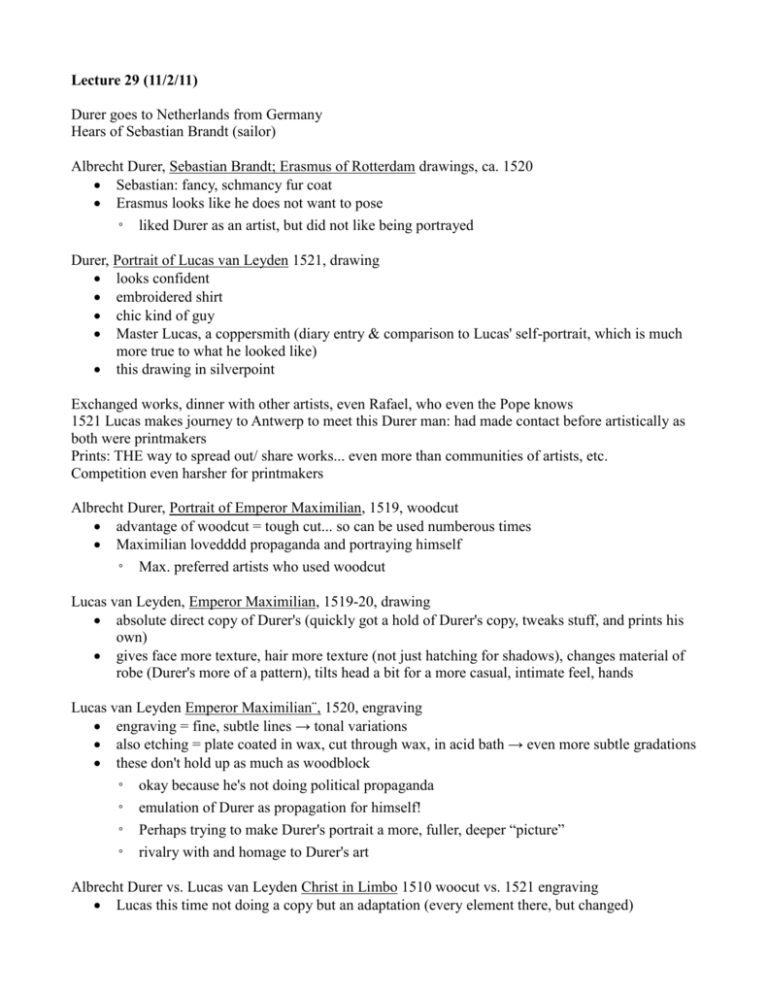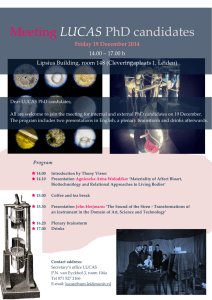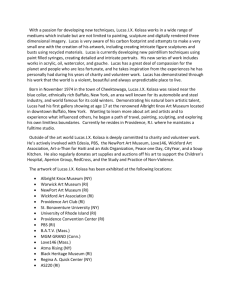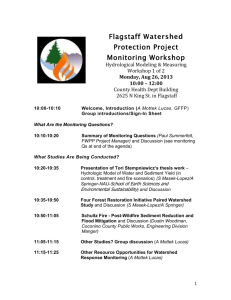Lecture 29 (11/2/11) Durer goes to Netherlands from Germany
advertisement

Lecture 29 (11/2/11) Durer goes to Netherlands from Germany Hears of Sebastian Brandt (sailor) Albrecht Durer, Sebastian Brandt; Erasmus of Rotterdam drawings, ca. 1520 Sebastian: fancy, schmancy fur coat Erasmus looks like he does not want to pose ◦ liked Durer as an artist, but did not like being portrayed Durer, Portrait of Lucas van Leyden 1521, drawing looks confident embroidered shirt chic kind of guy Master Lucas, a coppersmith (diary entry & comparison to Lucas' self-portrait, which is much more true to what he looked like) this drawing in silverpoint Exchanged works, dinner with other artists, even Rafael, who even the Pope knows 1521 Lucas makes journey to Antwerp to meet this Durer man: had made contact before artistically as both were printmakers Prints: THE way to spread out/ share works... even more than communities of artists, etc. Competition even harsher for printmakers Albrecht Durer, Portrait of Emperor Maximilian, 1519, woodcut advantage of woodcut = tough cut... so can be used numberous times Maximilian lovedddd propaganda and portraying himself ◦ Max. preferred artists who used woodcut Lucas van Leyden, Emperor Maximilian, 1519-20, drawing absolute direct copy of Durer's (quickly got a hold of Durer's copy, tweaks stuff, and prints his own) gives face more texture, hair more texture (not just hatching for shadows), changes material of robe (Durer's more of a pattern), tilts head a bit for a more casual, intimate feel, hands Lucas van Leyden Emperor Maximilian¨, 1520, engraving engraving = fine, subtle lines → tonal variations also etching = plate coated in wax, cut through wax, in acid bath → even more subtle gradations these don't hold up as much as woodblock ◦ okay because he's not doing political propaganda ◦ emulation of Durer as propagation for himself! ◦ Perhaps trying to make Durer's portrait a more, fuller, deeper “picture” ◦ rivalry with and homage to Durer's art Albrecht Durer vs. Lucas van Leyden Christ in Limbo 1510 woocut vs. 1521 engraving Lucas this time not doing a copy but an adaptation (every element there, but changed) ◦ hinged door ◦ snout-nosed demon ◦ man and child ◦ etc. Lucas good at space and viewpoint (showing off (: harhar) ◦ viewer's position downward, but closer up vs. Durer's farther away and straight on ◦ Lucas' positioning emphasizes Christ helping that dude up... we are more than a witness. We are now one of the hopeless souls and we could be next to be healed Lucas from city of Leyden Leyden = not a huge metropolosi, small town in northern Netherlands (compared to Antwerp) surrounded by walls, not a coastal city never a trade center, but a manufacturing town, esp. cloth manufacture lively and local pride Cornelis Engelbrechtsz: Fan Lander says he's teacher of Lucas, but Snyder has doubts Het Schilder-Boeck book in 1604: information of Netherlandish artists Title page of Het Schilderboeck and Portrait of Karel van Mander by Jan Senredam after Hendrick Goltzius, engraving 1604 Fan Lander's book includes information on Italian painters (weird!), poem on how to study art, etc. → instructional book on how to become a good painter, good person as a painter thick book not just biographies, but to provide role models (positive and negative) following 2 paintings in this book ◦ Lucas a “good role model” ◦ almost mystical ◦ toipoi refelcts culture's ideas of what artist ought to be: innately talented, child genius, blahblah ▪ inwardly called to be an ARTIST ▪ work for sheer love of art, not money ▪ hard working, keep practicing ◦ Lucas an ambitious genius whom locals and foreign admire ▪ such strong talent that almost needs no mentor! ▪ Father, Hugo Jacebson perhaps trained in art at local monastery, probably a trainer figure Lucas probably trained to see art as a business, etc. prints important in the production of paints... used as models, inspirations, etc. ◦ Lucas leaves and trains under Cornelis (skip over next 2 works) Lucas, Old Couple Making Music, 1524 (engraving) Lucas, Christ Healing the Blind Man 1531 Cornelis Engelbrechtsz Lamentation Triptych, ca. 1510 vs. Lucas Christ Healing the Blind Man 1531 stylistically super different from Cornelis' was once a triptych but sown together → one continuous ◦ even as triptych, should be seen as one whole tableau ◦ Christ Healing Blind Man... not a subject done befreo made story extremely clear. Did not put in all this secondary stuff wings usually carry extra info... donor portraits, etc., but Lucas uses wings to include more witnesses → totally appropriate for a narrative about a miracle!, which is proved by witnesses Cornelis' a typical devotional image (Lamentation, patron dudes on side, yadayada) ◦ vignettes detail the sides of center panel ◦ marginalizes narrative Lucas committed to producing narrative continuity within a single, unified space ◦ “telling a story” becomes important in art in this generation lacks “ultrademonstration”... even though a lot of stuff happening.... center of central panel so clear....... all this inspired by woodcut.... nothing is copied, but all concept come from this only 16 of Lucas' paintings survive today... that's why mostly known as printmaker why disappeared...? Lucas was an experimenter on canvases... not prepared in a fine why... destructible but cheaper → Lucas could appeal to crowd like his prints did while giving him room to experiement Lucas van Leyden The Card Players ca. 1515 on panel subject portrayed without moral framing 17th. c. Dutch painting social situation, where viewer invents what has happened and what will happen ◦ card games all about... what's going to happen next? What will my cards do for me next? ◦ Inn in countryside ◦ gambling with cards... new hobby for middle class, but fun and popular Lucas also received commission for altarpieces Lucas, Last Judment Triptych 1526-27 still considered one of northern Netherlandish masterpieces Fan Landen says: church patronaged a lotttttt for artistically eerie gentleness: Lucas' world at end of time = great open space with a shitton of nude figures ◦ delicately modest ◦ more Classical nude form... muscled, inventive, posing Lucas translates Durer into painting should be when mankind loses control because time is over... but Lucas protrays as still in control





